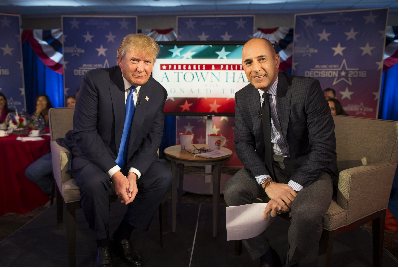By Bob Allen
Southern Baptist pastor and Fox News contributor Robert Jeffress said Oct. 26 he believes presidential candidate Donald Trump is being buoyed in the polls by “closeted” evangelicals who believe electing a strong leader is more important than whether a candidate has a deep personal faith.
Jeffress, pastor of the 12,000-member First Baptist Church in Dallas, penned an op-ed commentary Oct. 26 describing the appeal to people in the pew of the real estate mogul and television personality:
 “Last week I was on a plane, seated next to a woman in her mid-60s who identified herself as a Christian and explained her support for Trump: ‘I’m tired of all the B.S. (and she didn’t mean “Bible study”). I’m looking for someone who can get something done and Trump’s the guy who can do it.’ The next day on my return trip a young flight attendant knelt by the side of my seat and — when no one was looking — whispered, ‘Thank you for saying some positive things about Trump. I think he’s the only hope for our country.’”
“Last week I was on a plane, seated next to a woman in her mid-60s who identified herself as a Christian and explained her support for Trump: ‘I’m tired of all the B.S. (and she didn’t mean “Bible study”). I’m looking for someone who can get something done and Trump’s the guy who can do it.’ The next day on my return trip a young flight attendant knelt by the side of my seat and — when no one was looking — whispered, ‘Thank you for saying some positive things about Trump. I think he’s the only hope for our country.’”
Jeffress, who made headlines after praying at a Trump rally in Dallas and appearing in video of a group of evangelical leaders laying hands in prayer for the candidate at an invitation-only meeting in Trump Tower in New York, said “while no one is going to accuse The Donald of being overly pious,” many evangelicals perceive him as someone who can tackle tough issues.
“After crisscrossing the country for the past few months and talking to thousands of people, I’m convinced that there are a legion of ‘closeted’ evangelical Trump supporters who are almost apologetic for being attracted to him,” Jeffress said. “They are not under any illusion that Trump will be conducting Bible studies in the Oval Office, nor do they feel like they are abandoning their Christian values to support Trump. Instead, this time around, they are simply weighting ‘strong leader’ more heavily than ‘committed Christian’ in the presidential equation.”
Jeffress contrasted Trump to the other GOP frontrunner, Ben Carson, who appeals to evangelicals primarily because of his “uncontested commitment to Christianity.”
Trump, who identifies as a Presbyterian, recently sparked controversy by raising the issue of Carson’s Seventh-day Adventist faith during a campaign rally.
“I’m Presbyterian,” Trump said at a rally Oct. 24 in Jacksonville, Fla. “Boy, that’s down the middle of the road, folks, in all fairness. I mean, Seventh-day Adventist, I don’t know about. I just don’t know about.”
Carson, who also played the religion card in September saying he would not support a Muslim running for president, missed an opportunity to speak last summer at the Southern Baptist Convention Pastor’s Conference in Columbus, Ohio, after bloggers raised concern over his theology.
A pamphlet by the SBC North American Mission Board says members of the Seventh-day Adventist Church, best known because it worships on Saturday instead of Sunday, “may be genuinely saved Christians based on personal faith in Jesus Christ,” but the denomination “has some teachings that deviate from historic Christian doctrine.”
Points of difference between Southern Baptists and Seventh-day Adventists, the pamphlet says, include the belief that Adventist founder Ellen White possessed a modern “spirit of prophecy,” and her visions and writings were divinely inspired interpretations of Scripture. Adventists also deny the doctrine of an eternal hell.
Jeffress said in a Fox News broadcast he doesn’t believe the question of Carson’s church affiliation is meaningful to evangelical voters.
“If people want to know what Seventh-day Adventists believe, they can Google it,” Jeffress told interviewer Tucker Carlson in an Oct. 25 segment on why support for Trump is declining among evangelicals in Iowa. “But really, the differences between Presbyterianism and Seventh-day Adventism are not that great. It’s certainly not like the difference between say Presbyterianism and Mormonism, so I don’t think it’s going to be an issue at all.”
Jeffress made waves in the last presidential election when he described the Church of Jesus Christ of Latter-day Saints as a “cult” and said evangelicals should not vote for then-candidate Mitt Romney because he is a Mormon. Jeffress, who supported Texas Gov. Rick Perry during the 2012 campaign, later conceded “it is better to vote for a non-Christian who supports biblical principles like life and marriage than voting for a professing Christian like Barack Obama who absolutely repudiates what Jesus Christ said about some key issues.”
Previous stories:
SBC Pastors Conference criticized for inviting non-Baptist presidential hopeful to speak
